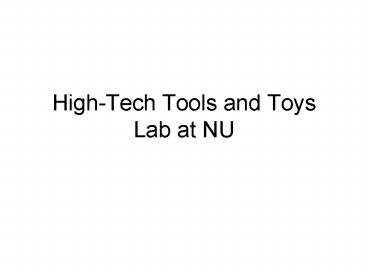HighTech Tools and Toys Lab at NU - PowerPoint PPT Presentation
1 / 24
Title:
HighTech Tools and Toys Lab at NU
Description:
Speed of sound in air determined by linear least square fit ... Plot x-t data points and least-squares fit to find slope=speed of sound in water ... – PowerPoint PPT presentation
Number of Views:48
Avg rating:3.0/5.0
Title: HighTech Tools and Toys Lab at NU
1
High-Tech Tools and Toys Lab at NU
2
Hardware Standard Agilent Test and Measurement
Set
- Power supply
- Signal Generator
- Multimeter
- Oscilloscope
3
HTTTL Hardware
- 5-V stepper motor and IC controller
- 40 kHz ultrasound transducers
- 1 MHz ultrasound transducers and aquarium
- X-Y positioner
- Logitech videocam
- Computer
- National Instruments PCI-6024E A/D card
- GPIB bus controller card
4
HTTTL Software
- MATLAB Data Acquisition Toolbox
- MATLAB Instrument Control Toolbox
- National Instruments NI-DAQ A/D card controller
software in C - MATLAB m-files
- one-step.m, cw.m, cc.m, readcell.m, setup_dio.m,
direct.m, move.m, setup_tank.m, and pulseecho.m - C programs to download videocam using Python
- Binarize.h, Binarize.lib
5
Part IHigh-Tech Tools and Toys Lab Ultrasound
Imaging with MATLAB
6
Lab 1 Measuring the Speed of Sound in Air
- Two 45kHz transducers in air (pitch/catch
configuration) - Delay time measured by digital oscilloscope
Distance by measuring tape on desk - 5-10 x vs. t data points measured and plotted in
Excel - Speed of sound in air determined by linear least
square fit - Extension measure amplitude vs. distance and
fit to 1/x dependence Energy C(Amplitude)2
7
HTTTL Acoustic Instrumentation Package
8
Measuring Speed of Sound in Air (EXCEL)
9
Lab 2 MATLAB Programming Control of Stepper
Motor
- Primitive programs provided
- onestep.m moves stepper motor one step
- cc.m, cw.m set direction
- readcell(dio, voltage) reads photocell on dial
- Student programs
- for and while loops
- if else logic
- Goal measure stepper motor degrees per step
10
First Programs Control of Stepper Motor
11
Lab 3 X-Y Positioner
- Control x and y position of pen attached to
positioner - Write MATLAB programs to
- Write simple letters (H, T)
- Write more complicated letters (A, N, O)
- Draw raster pattern, recording the position of
pen on a centimeter grid
12
Lab 4 Speed of Sound in Water
- 1MHz ultrasound transducer attached to x-y
positioner in aquarium - Transmitted and reflected pulses recorded on
oscilloscope - Scope trace downloaded over GPIB bus
- Program MATLAB to measure delay time from
transmit pulse to reflected pulse - Program positioner to change distance to aquarium
side and take data of x(i), t(i) - Plot x-t data points and least-squares fit to
find slopespeed of sound in water
13
Lab 5 Imaging Surface Shape
- Goal Use MATLAB program to image aluminum shape
under opaque gelatin - Program x-y positioner to move 1 MHz transducer
in raster pattern in aquarium - Download scope trace of V(t)
- Process with MATLAB to find distance to target at
each point - MATLAB 3D plot of distance vs. position shows
shape of object
14
Subsurface Shape in Opaque Gelatin
15
Imaging a Subsurface Shape
16
Subsurface Object Imaged
17
Lab 6 Introduction to C
- Analyze Speed of Sound in Air data using C
array process and linear regression formulas
18
Part IIHigh-Tech Toys and Tools Object-Sorting
Labs
- Create C program to identify color of video-cam
output and actuate stepper motor to sort balls
19
Lab 7 Digital Output
- Call NI-DAQ program for digital output
- Measure DIO output with voltmeter
- Use 4 DIO 1-bit outputs to drive 4 LEDs
- Counting
- Bitwise AND and OR operations ( and )
- Use DIO output to drive stepper motor
- Extention Use Analog Input from photocell for
position feedback
20
Lab 8 Using Videocam to Recognize Colors
- Use provided programs to
- Capture image image.Capture()
- Download pixels image.GetPixels(A)
- Distribute array A into 240 rows x 320 columns
- Extract RGB values from 24-bit integer (bitwise
AND) - Average RGB values and convert to HSV
(Hue-Saturation-Value) - Use H (hue angle) to determine color of paper on
clipboard - Two colors (horizontal or vertical)
- Four colors
- Central color
21
Lab 9 Sort Ping-Pong Balls by Color
- Two-color sorting (Video 1)
- Recognize color of manually positioned ball
- Rotate right or left to receptacle tube 1 or 2
- Four-color sorting (Video 2)
- Add linear actuator to hold up balls
- Recognize color of ball
- Rotate to appropriate receptacle tube (1-4)
- Activate linear actuator to drop ball
- Repeat for n balls
22
C Control for Color-Sorting in HTTTL
23
High-Tech Tools and Toys Lab
Video 1 2-color sorting (click image to start)
24
High-Tech Tools and Toys Lab
Video 2 4-color sorting (click image to start)

